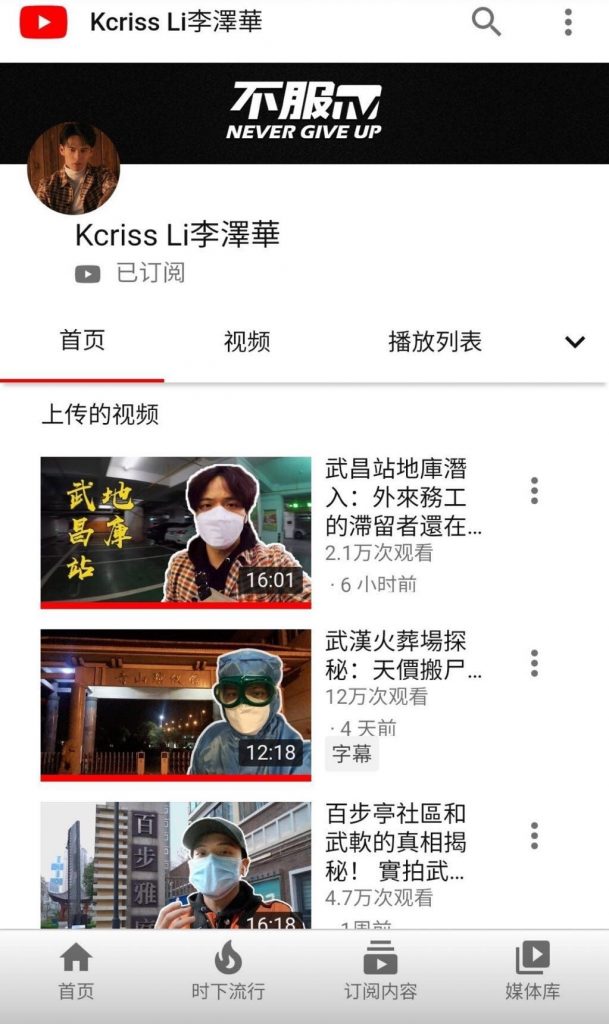On Wednesday this week, Li Zehua (李泽华), a journalist who recently resigned from his job as a news anchor at China’s state-run China Central Television to report as a citizen reporter on the front lines of the epidemic in Wuhan, was apparently detained by officers from state security. His whereabouts are currently unknown.
Li, who had managed to livestream his dispatches, and who also reported continued harassment from local police and security guards, arrived at Wuhan’s Baibuting Community, an area hit particularly hard by the epidemic, on February 16. He livestreamed a story on February 18 from a crematorium in the city about how porters were being hired at high wages in order to transport corpses. On February 25, he did a report in which he interviewed migrant workers who were forced to set up camp in the underground parking garage at Wuchang Railway Station.
Li’s citizen journalism in Wuhan followed in the footsteps of two other journalists, Fang Bin and Chen Qiushi, both of whom are now missing.
As state security officers caught up with him and prepared to detain him Wednesday, Li Zehua recorded a final message speaking to the men outside his door.

In this message, he talks about his belief in the importance of speaking up and the inspiration he took from Chai Jing (柴静), the celebrity CCTV anchor whose documentary “Under the Dome,” about serious air pollution in China, drew more than 300 million views online before being deleted by authorities.
Our translation of Li Zehua’s message follows.
_____________
OK, I’m getting ready to open the door. Can I say a few things?
First of all, I admire those of you who have hunted me down. I admire the diverse methods you employed under the light of day to track down my position so accurately. The way too that you managed to pressure my friends XX to come over.
Secondly, from the time I first arrived in Wuhan everything I have done has been in accord with the Constitution of the People’s Republic of China and with its laws. I had full protective gear for all of the places I visited that were designated as danger areas – a protective jacket, goggles, disposable gloves, disinfectant. I had plenty of all of these things, a full supply of materials. This 3M mask, this was bought for me by a friend who supported me. So right now I’m physically fine. My body is strong and healthy. If you say I have a temperature, this can only be because it’s too stuffy inside all of this gear.
Of course, the third thing is that I realize at this point that it’s highly unlikely I won’t be taken away and won’t be quarantined. I just want to make it known, thought, that I have a clear conscience toward myself, a clear conscience toward my parents, a clear conscience toward my family, and also a clear conscience toward the Communication University of China from which I graduated, and toward the journalism field in which I did my studies. I also have a clear conscience toward my country, and I have done nothing to harm it. I, Li Zehua, 25 years of age, had hoped I could, like Chai Jing [the former CCTV journalist who made the documentary “Under the Dome”], work on the front lines, that I could make a film like the one she did in the environment of 2004 about the fight against SARS in Beijing. Or like “Under the Dome” in 2016, the one that was completely blocked online.
I think if you big guys outside the door went to middle school, which of course you did, and if your memories are good, you’ll definitely remember the essay we all had to read by Lu Xun, the one called, “Has China Lost It’s Confidence?” There’s a line I’ve always found inspiring where Lu Xun says: “In this China of ours there have always been those who speak for the people, who fight tenaciously, who abandon their bodies in search of the truth . . . . In these people we discover China’s spine.”
I’m not willing to disguise my voice, nor am I willing to shut my eyes and close my ears. That doesn’t mean that I can’t live a happy and comfortable life with a wife and kids. Of course I can do that. But why did I resign from CCTV? The reason is because – I hope more young people, more people like me, can stand up!
But this isn’t for the sake of uprising or anything like that, that’s not what I mean. It’s not as though we oppose the Party simply by saying a few words. I know that our idealism was already annihilated in spring and summer that year [1989], and sitting quietly [in protest] no longer accomplishes anything.
Today’s youth, who go onto Bilibili, Kuaishou and Douyin and swipe their way through social media, probably have no idea at all what happened in our past. They think the history they have now is the one they deserve.
I think everyone is like Truman, and when they discover that strange radio frequency, and when they find the exit door, they walk out and feel they can never go back.
The last thing I’ll say is, I’m sorry.
I’ll just say, I really understand you guys outside the door. I understand the mission you’ve been given. But I also sympathize with you, because when you support, without conditions and without reason, such a cruel order, the day will come when the same cruel order falls on your own heads.
OK, that’s it. I’m ready to open the door.




















